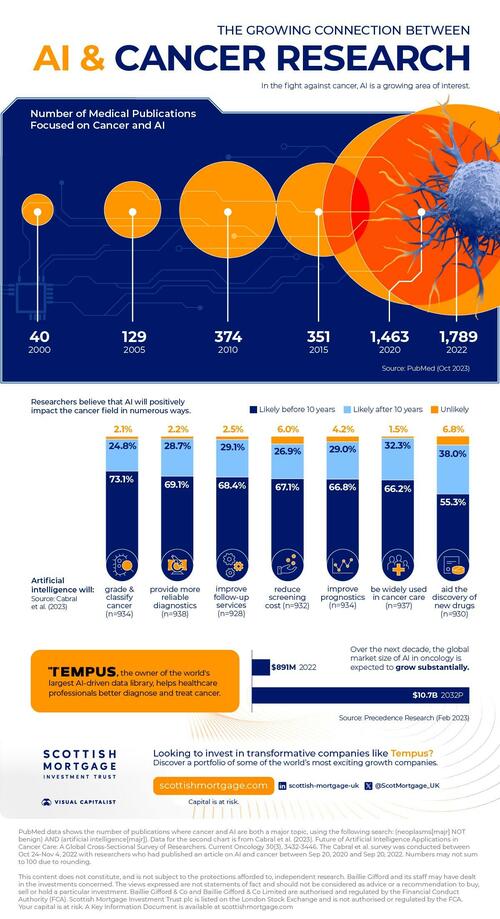
Cancer research has evolved significantly over time. In 1882, a surgeon performed the first mastectomy to treat breast cancer. By 1950, researchers linked smoking to lung cancer. In 2010, the FDA approved a vaccine to treat prostate cancer.
Now, as Visual Capitalist's Jenna Ross and Sabrina Fortin explain below, researchers have found another weapon in the fight against cancer: AI.
This graphic from Scottish Mortgage Investment Trust explores the growing role that AI is playing in cancer research.
Cancer Research Publications
The influence of AI is evident in the scientific literature. PubMed, a database of biomedical research, has seen growth in the number of articles where both AI and cancer are a major topic.
Source: PubMed (as of Oct 17, 2023)
The number of publications has risen substantially, particularly in the last few years.
The Potential of AI
Researchers believe that AI will positively impact the cancer field in numerous ways. In a 2023 study, authors of peer-reviewed scientific articles on AI and cancer were asked about the future of AI.
Source: Cabral et al. (published in 2023, survey was conducted from Oct-Nov 2022). Totals may not sum to 100 due to rounding.
Above all, researchers expect AI to have the highest near-term impact on grading and classifying cancer through image analysis. A cancer’s grade refers to how abnormal the cells look, with more abnormal cells growing more quickly.
Following this, researchers believe AI will provide more reliable diagnostics. Recent developments appear to support these beliefs.
In November 2023, new cancer research showed that AI flagged up to 13% more early stage-breast cancer cases than doctors identified. This is a significant part of the 20% or more cancers that are estimated to be missed using current non-AI screening. Notably, the AI tool was also estimated to save nearly half of the time spent reading breast cancer scans.
The Future of AI-Powered Cancer Care
Analysts project that the global market size of AI in oncology could grow from $891 million in 2022 to $10.7 billion in 2032. Tempus, the owner of the world’s largest AI-driven clinical data library, is positioned to capitalise on this opportunity.
Using AI to gather insights from over 6 million patient records, Tempus helps healthcare professionals better diagnose and treat cancer. Not only that, Tempus earns revenue by charging pharmaceutical companies to access its data library, fueling the discovery of new treatments.
Cancer research has evolved significantly over time. In 1882, a surgeon performed the first mastectomy to treat breast cancer. By 1950, researchers linked smoking to lung cancer. In 2010, the FDA approved a vaccine to treat prostate cancer.
Now, as Visual Capitalist’s Jenna Ross and Sabrina Fortin explain below, researchers have found another weapon in the fight against cancer: AI.
This graphic from Scottish Mortgage Investment Trust explores the growing role that AI is playing in cancer research.
Cancer Research Publications
The influence of AI is evident in the scientific literature. PubMed, a database of biomedical research, has seen growth in the number of articles where both AI and cancer are a major topic.
Source: PubMed (as of Oct 17, 2023)
The number of publications has risen substantially, particularly in the last few years.
The Potential of AI
Researchers believe that AI will positively impact the cancer field in numerous ways. In a 2023 study, authors of peer-reviewed scientific articles on AI and cancer were asked about the future of AI.
Source: Cabral et al. (published in 2023, survey was conducted from Oct-Nov 2022). Totals may not sum to 100 due to rounding.
Above all, researchers expect AI to have the highest near-term impact on grading and classifying cancer through image analysis. A cancer’s grade refers to how abnormal the cells look, with more abnormal cells growing more quickly.
Following this, researchers believe AI will provide more reliable diagnostics. Recent developments appear to support these beliefs.
In November 2023, new cancer research showed that AI flagged up to 13% more early stage-breast cancer cases than doctors identified. This is a significant part of the 20% or more cancers that are estimated to be missed using current non-AI screening. Notably, the AI tool was also estimated to save nearly half of the time spent reading breast cancer scans.
The Future of AI-Powered Cancer Care
Analysts project that the global market size of AI in oncology could grow from $891 million in 2022 to $10.7 billion in 2032. Tempus, the owner of the world’s largest AI-driven clinical data library, is positioned to capitalise on this opportunity.
Using AI to gather insights from over 6 million patient records, Tempus helps healthcare professionals better diagnose and treat cancer. Not only that, Tempus earns revenue by charging pharmaceutical companies to access its data library, fueling the discovery of new treatments.
Loading…







